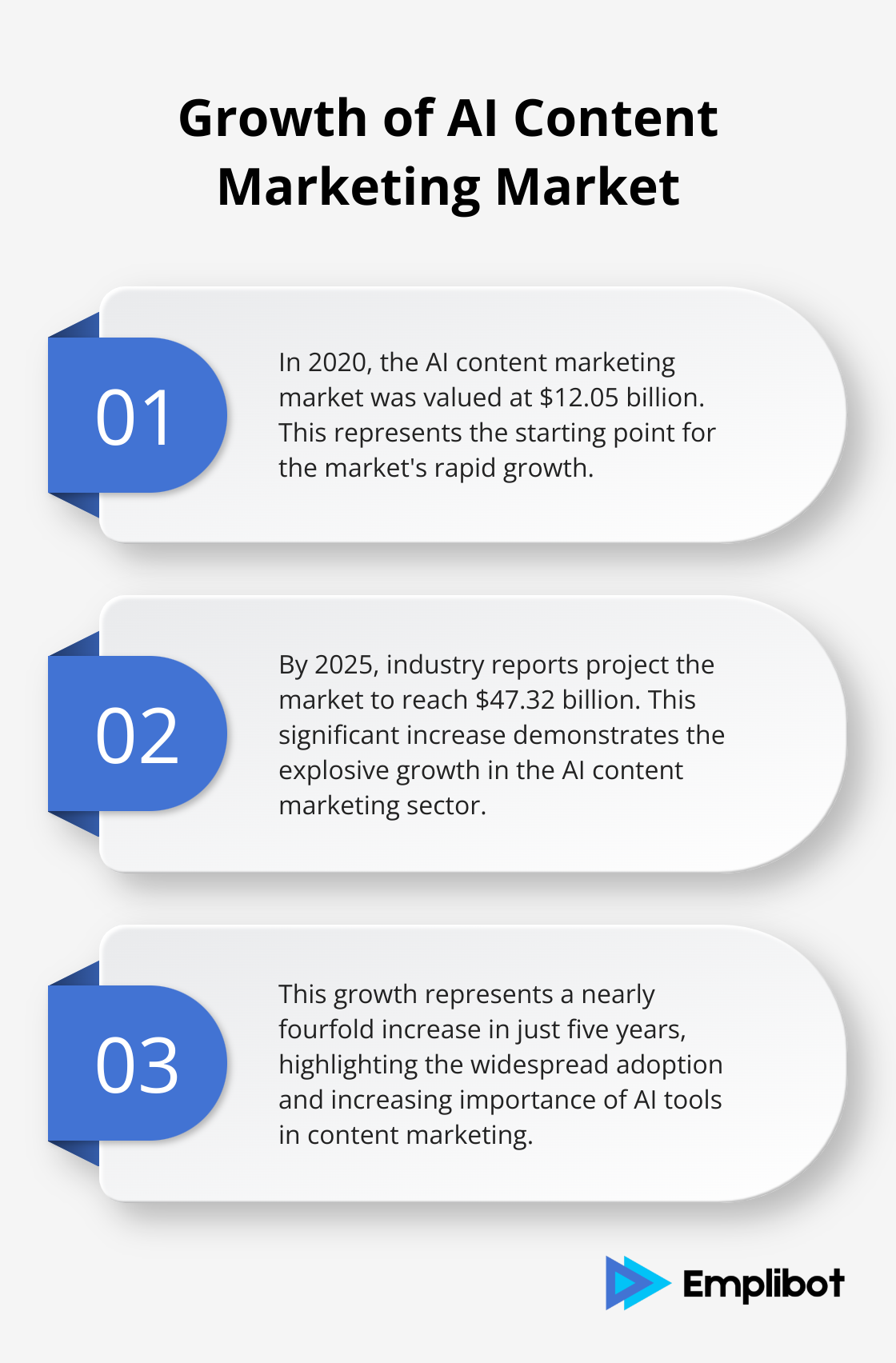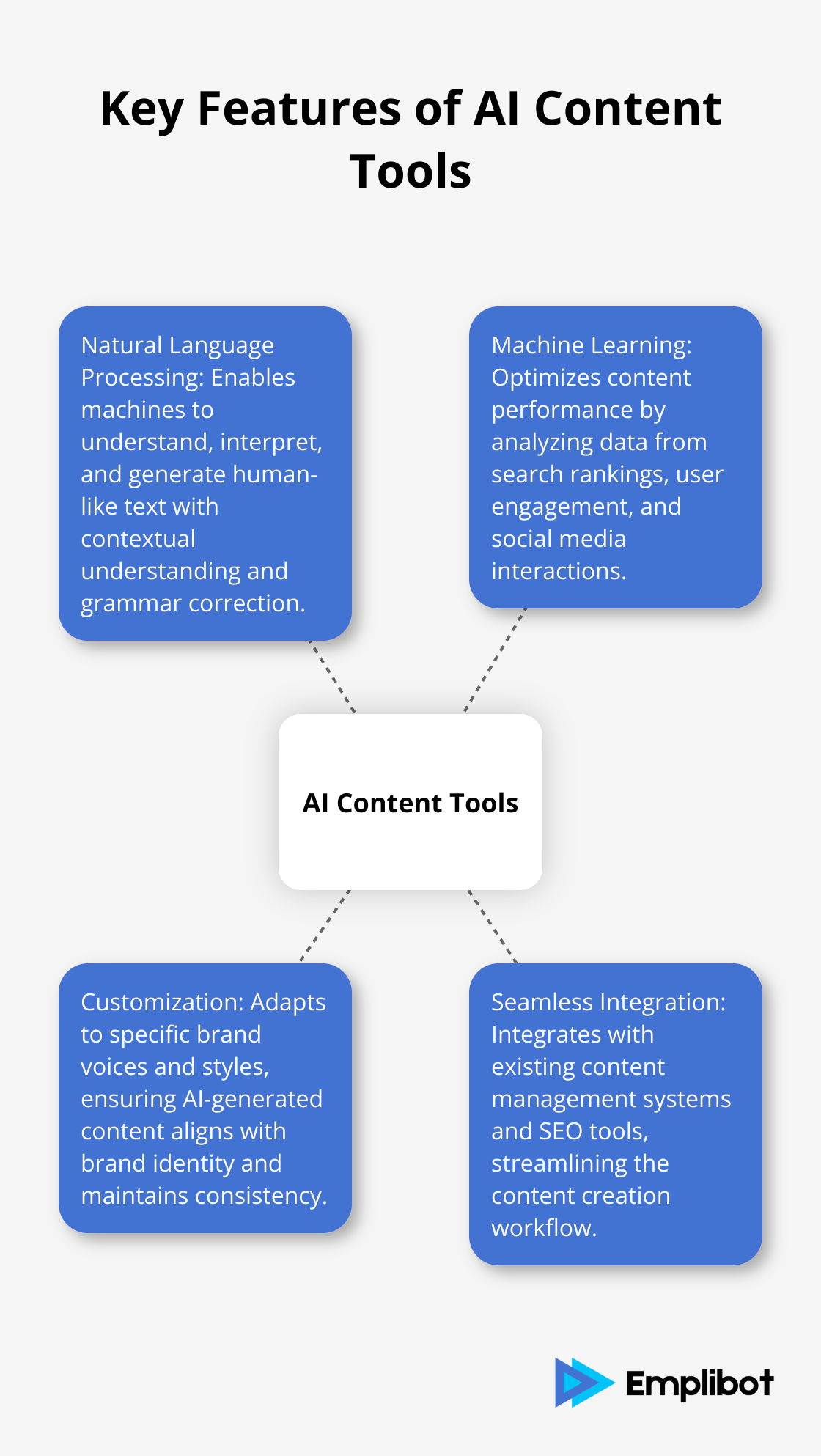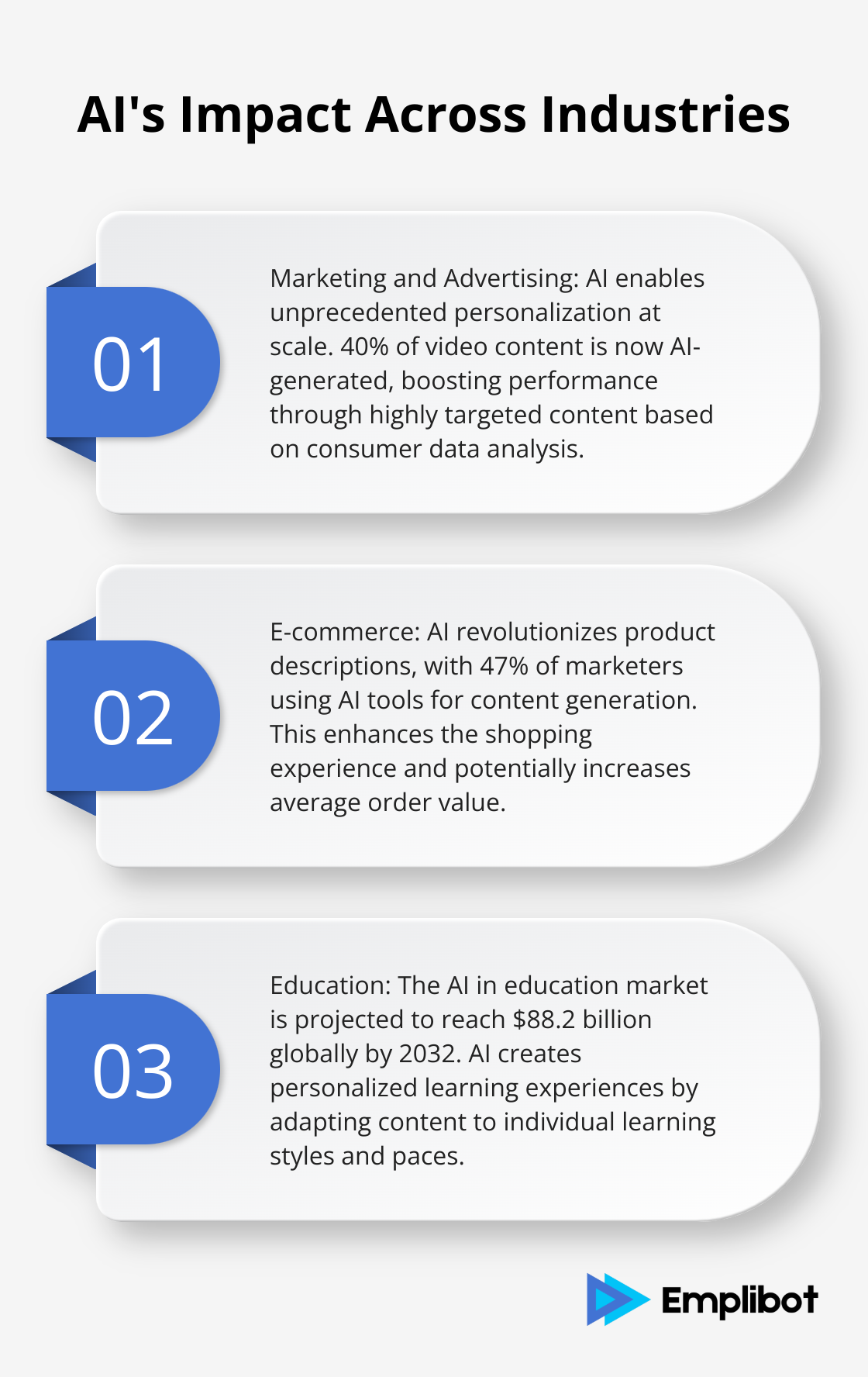AI content writing is revolutionizing the way we create and consume information. At Emplibot, we’ve witnessed firsthand how this technology is transforming industries across the board.
From marketing to journalism, AI-powered tools are enhancing productivity and enabling the creation of highly personalized, engaging content at scale. In this post, we’ll explore the key features of AI writing tools and their impact on various sectors, while also considering the challenges and ethical implications of this rapidly evolving technology.
How AI Transforms Content Creation
The Evolution of AI in Content Writing
The content creation landscape has undergone a dramatic transformation in recent years, with AI leading the charge. Traditional methods of content production, once reliant on human writers and basic word processors, have given way to sophisticated AI-powered tools. These tools now shape how we produce, optimize, and distribute content.
The AI content marketing market has experienced explosive growth. In 2020, it was valued at $12.05 billion. Industry reports project this figure to reach $47.32 billion by 2025 (a nearly fourfold increase in just five years). This rapid expansion reflects the widespread adoption of AI tools across various sectors.

Meeting the Demand for Personalized Content
High-quality, personalized content is now in high demand. A study by Siege Media reveals that 44.4% of those leveraging interactive content report a mildly or very successful strategy compared to 39.9% of those who don’t invest in it. This surge stems from the need to engage audiences with tailored content at scale.
Advantages of AI-Powered Content Writing
AI content writing tools offer several key advantages:
- Speed and Efficiency: AI generates content significantly faster than human writers. Some marketers report that AI-assisted blog writing tools can increase organic traffic by 120% within six months.
- Scalability: AI allows businesses to produce large volumes of content without proportionally increasing resources. This proves particularly valuable for e-commerce platforms that need thousands of product descriptions.
- Data-Driven Insights: AI analyzes vast amounts of data to inform content strategy.
- SEO Optimization: AI tools analyze top-performing content and optimize for keywords, improving search engine rankings.
- Multilingual Content: AI facilitates content creation in multiple languages, helping businesses expand into global markets more efficiently.
The Human Element in AI-Powered Content Creation
While AI offers numerous benefits, human oversight remains essential. AI excels at data analysis and content generation, but it lacks the nuanced understanding of brand voice and cultural context that human writers provide. The future of content creation lies in the synergy between AI capabilities and human creativity.
AI Tools and Their Impact
The impact of AI on content creation extends beyond just writing. AI tools now assist with various aspects of the content creation process:
- Content Ideation: AI analyzes trends and user data to suggest relevant topics and content ideas.
- Grammar and Style Checking: Advanced AI-powered tools (like Grammarly) offer real-time suggestions for improving writing quality.
- Content Optimization: AI tools provide recommendations for optimizing content structure, readability, and SEO performance.
- Image and Video Creation: AI-powered tools now generate and edit visual content, complementing written material.
As we move forward, the integration of AI in content creation will continue to evolve, presenting new opportunities and challenges for content creators and marketers alike. The next section will explore the key features of AI content writing tools in more detail, shedding light on the technologies that power these transformative capabilities.
What Makes AI Content Tools So Powerful?

Natural Language Processing Transforms Writing
AI content writing tools harness the power of Natural Language Processing (NLP) to revolutionize content creation. NLP enables machines to understand, interpret, and generate human-like text with contextual understanding, grammar correction, and analysis of emotional tone. These algorithms analyze vast amounts of text data to learn patterns, context, and language nuances. As a result, AI-powered tools produce coherent and contextually relevant content.
OpenAI’s GPT-3, one of the most advanced language models, exemplifies this technology. It generates human-like text across various topics and styles, finding applications in content creation, chatbots, and even code generation. The latest iteration, GPT-4, demonstrates even more impressive capabilities in understanding context and generating nuanced responses.
Machine Learning Enhances Content Performance
Machine learning algorithms optimize content for better performance. These algorithms analyze data from search engine rankings, user engagement metrics, and social media interactions to identify patterns that contribute to content success.
Content optimization tools powered by machine learning suggest improvements in real-time. They recommend changes to headlines, adjust content structure for better readability, and even predict the potential performance of a piece of content before publication. AI can help content writers save time, increase productivity, and improve the quality of their work by providing valuable insights.
Customization Maintains Brand Voice
AI content tools adapt to specific brand voices and styles, marking a significant advancement in the field. These tools train on a company’s existing content to learn its unique tone, vocabulary, and writing style. This feature ensures that AI-generated content aligns with the brand’s identity and maintains consistency across all channels.
Some AI writing assistants allow users to create custom style guides or import existing brand guidelines. The AI then uses these parameters to generate content that matches the brand’s voice, whether it’s formal, casual, technical, or conversational.
Seamless Integration Improves Workflow
Modern AI content tools integrate seamlessly with existing content management systems (CMS) and SEO tools. This integration streamlines the content creation workflow, from ideation to publication and distribution.
Many AI writing tools publish content directly to popular CMS platforms like WordPress. They also integrate with SEO tools to suggest optimizations based on target keywords and competitor analysis. Some tools offer built-in plagiarism checkers and readability analyzers to ensure content quality.
The Future of AI Content Tools
As AI content tools continue to evolve, they will redefine the content creation landscape. These tools will offer unprecedented efficiency and quality, combining advanced features into cohesive, user-friendly packages. However, human creativity and oversight will remain essential for producing truly engaging and impactful content. The next chapter will explore how AI content writing impacts various industries, from marketing to education.
How AI Reshapes Industries Through Content

Marketing and Advertising: Personalization at Scale
AI content writing transforms various sectors, revolutionizing how businesses communicate, sell, and educate. This technology redefines industry standards and practices.
In marketing and advertising, AI content tools enable unprecedented personalization at scale. A study by Zebracat reveals that AI-generated videos account for 40% of video content. This boost in performance stems from AI’s ability to analyze vast amounts of consumer data and create highly targeted content.
A clothing retailer might use AI to generate personalized product recommendations based on a customer’s browsing history, purchase patterns, and demographic information. The AI then crafts tailored email campaigns or social media posts that speak directly to each customer’s preferences, increasing engagement and sales.
E-commerce: Enhanced Product Descriptions
AI revolutionizes product descriptions in e-commerce. With millions of items listed on platforms like Amazon and Alibaba, creating unique, compelling descriptions for each product manually becomes virtually impossible. AI steps in to generate descriptions that are not only accurate but also optimized for search engines.
A study by Siege Media found that 47% of marketers use AI tools for content generation, including product descriptions. These AI-generated descriptions can include key features, benefits, and even suggest complementary products, enhancing the overall shopping experience and potentially increasing average order value.
Journalism: Speed and Accuracy in News Reporting
AI makes waves in journalism by enabling rapid news generation and fact-checking. The Associated Press uses AI to produce thousands of earnings reports and sports recaps annually. This allows human journalists to focus on more complex, investigative stories that require nuanced understanding and in-depth research.
AI tools assist in fact-checking, helping to combat the spread of misinformation. They can quickly cross-reference information across multiple sources, flagging potential inaccuracies for human review. This combination of AI efficiency and human oversight maintains journalistic integrity in the fast-paced digital news environment.
Education: Personalized Learning Experiences
AI content tools create more engaging and personalized learning experiences in education. Allied Market Research projects the AI in education market to reach $88.2 billion globally by 2032. This growth is driven by AI’s ability to adapt content to individual learning styles and paces.
An AI-powered e-learning platform might analyze a student’s performance and generate customized practice questions or explanations. This tailored approach helps students grasp concepts more effectively and can significantly improve learning outcomes.
Technical Writing: Simplified Complex Information
AI proves invaluable in simplifying complex information in the realm of technical documentation. AI tools can generate user manuals, API documentation, and troubleshooting guides that are clear, concise, and easy to understand.
A software company might use AI to automatically generate documentation for new features or updates. The AI can explain technical concepts in user-friendly language, ensuring that even complex products are accessible to a wider audience. This not only improves user experience but also reduces the workload on technical writers, allowing them to focus on more strategic tasks.
Final Thoughts
AI content writing reshapes the landscape of content creation across industries. It enables unprecedented levels of personalization, efficiency, and scalability in marketing, e-commerce, journalism, and education. These advancements fundamentally change how we create, consume, and interact with content.
Human oversight and creativity remain indispensable despite AI’s remarkable capabilities. AI excels at data analysis and pattern-based content generation, but it lacks the nuanced understanding of context, emotion, and cultural subtleties that human writers bring. The future of content creation lies in a symbiotic relationship where AI augments human creativity and productivity.
Emplibot harnesses the power of AI to automate content creation and distribution for WordPress blogs and social media platforms. Our solution demonstrates how AI produces high-quality, engaging content while saving time and resources. We emphasize the importance of human input in guiding the AI and ensuring content aligns with brand values and messaging.

